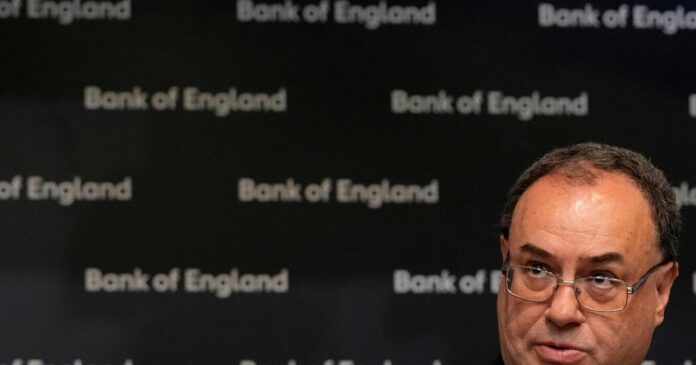As energy, food and commodity prices soar after the Russian invasion of Ukraine, the impact is clearly being felt around the world. In the UK, the central bank hiked interest rates to a 13-year high on Thursday in a bid to halt rapidly rising prices even as the risk of a recession grows.
The bank predicted inflation would rise to a four-decade high in the final quarter of this year and the UK economy would shrink by almost 1 per cent.
“Global inflationary pressures have escalated sharply leading up to and following the invasion,” Bank of England Governor Andrew Bailey said on Thursday. “This has led to a material deterioration in the outlook,” he added, for both the global and UK economy. On an annual basis, the economy would also contract next year.
The Bank of England raised interest rates from 0.75 percent to 1 percent, the highest level since 2009. Three members of the nine-member rate-setting committee wanted to take a more aggressive step and raise rates by half a percentage point. The Bank of England has hiked interest rates at every monetary policy meeting since December.
Prices in the UK rose 7 per cent year on year in March, the fastest pace since 1992. The central bank is forecasting that inflation will peak at over 10 per cent in the final quarter of the year as household energy bills start to rise again, when the government releases energy The price cap will be reset in October. Ten percent would be the highest rate since 1982.
The rapidly changing landscape was reflected in the prospects for economic growth. In 2023, the bank now predicts the economy will contract 0.25 percent instead of growing 1.25 percent, which it forecast three months ago.
On Wednesday, Federal Reserve policymakers hiked interest rates by half a percentage point, the biggest jump in 22 years, in a bid to cool the economy quickly as inflation is at its fastest pace in four decades. The US Federal Reserve also said it would begin to shrink the size of its balance sheet by allowing bond holdings to mature without reinvestment.
On Thursday, the Bank of England said its staff would begin planning to sell the government bonds it has bought, but a decision on whether to start those sales has not yet been made. The bank stopped making new net purchases late last year after buying £875 billion ($1.1 trillion) of bonds. The bank said it would provide an update in August.
Global economic prospects have been shaken by the war in Ukraine, which is pushing up the prices of energy, food and other commodities such as metals and fertilizers. The Covid pandemic continues to disrupt trade and supply chains, particularly with shutdowns due to China’s zero-COVID policy. Last month, the International Monetary Fund cut its forecast for global economic growth this year to 3.6 percent from 4.4 percent forecast in January.
The challenge for policy makers in the UK is great. The Bank of England has a mandate to achieve an inflation rate of 2 percent. At the same time, there are signs that the economy is already slowing, consumer confidence is falling and businesses are concerned that price increases will weigh on consumer spending, a key driver of economic growth. With inflation now at its highest level in three decades and wage growth lagging behind, UK households are facing painful budget squeezes.
Disposable household income, adjusted for inflation, is expected to fall 1.75 percent this year, the second-largest decline since records began in 1964, the bank said. The central bank’s challenge is to rein in inflation to ease the pressure on households and businesses without cooling the economy too much and plunging it into recession.
“Monetary policy must therefore navigate a narrow path between the heightened risks of elevated inflation and a tight labor market on the one hand, and further hampering activity as real incomes shrink on the other,” Mr Bailey said on Thursday.
In considering this alternative, votes for a rate hike showed that policymakers believed that if they did nothing, pressure on costs for businesses and prices for consumers would persist. Businesses expect selling prices for their goods and services to be raised sharply in the short term due to sharply increased spending, the bank said. At the same time, inflation could firm further as the unemployment rate is low, forcing companies to raise wages to meet their hiring needs.
















